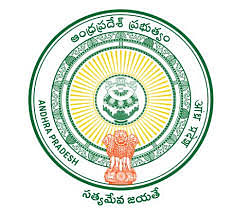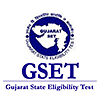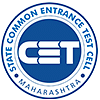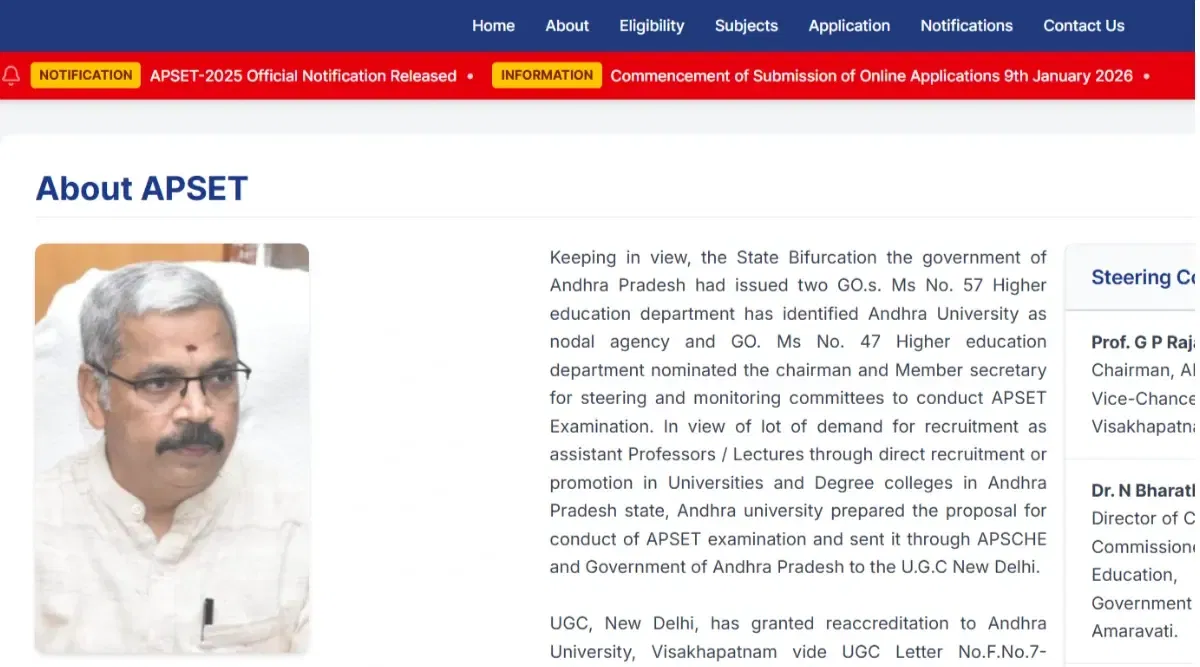Table of Contents
APSET syllabus 2025 is released by Andhra University, Visakhapatnam on behalf of the Government of Andhra Pradesh. The syllabus is released separately for both paper 1 and paper 2. Students who wish to appear for the APSET exam must be aware of the detailed syllabus which will help them prepare well. Each paper will have separate topics in the syllabus. The syllabus for APSET is released by the official authorities at apset.net.in every year.
In the APSET syllabus, paper-I is common to all candidates appearing and will be bilingual (English and Telugu). Apart from this, Paper II is subject specific and includes subjects like Commerce, Economics, Education, History, Political Science, Public Administration, and Sociology. All the remaining papers are in English only except Hindi, Sanskrit, Telugu, and Urdu. Candidates can check more on APSET syllabus 2025 from the page below:
APSET Syllabus 2025 Highlights
For the APSET 2025 syllabus, candidates should be well-prepared in both Paper I (General Aptitude) and Paper II (Subject-Specific). Listed below is APSET 2025 syllabus highlights outlining essential details about each section, including the number of questions, marking scheme, key topics, and time duration:
|
Sections |
Paper |
Key Topics/Chapters |
Exam Duration |
Marking Scheme |
|
General Aptitude |
Paper I (Teaching & Research Aptitude) |
|
1 hour |
50 questions, 2 marks each |
|
Subject-Specific |
Paper II (Selected Subject) |
Varies by subject (e.g., Literature, Social Sciences, Life Sciences) |
2 hours |
100 questions, 2 marks each |
APSET Syllabus 2025 PDF Download
Candidates can download the official APSET Syllabus PDFs from Andhra University’s APSET portal. These PDFs cover the syllabus in detail, including essential topics for Paper I and Paper II. Accessing these resources allows candidates to ensure they are studying the most accurate and updated syllabus content for the 2025 exam. Candidates can click on the links below to download the APSET syllabus 2025 PDF:
| Subject | Syllabus PDF Download |
| General Paper on Teaching & Research Aptitude (Paper I) | Download PDF |
| Computer Science & Application | Download PDF |
| History | Download PDF |
| Economics | Download PDF |
| Geography | Download PDF |
| Management | Download PDF |
| Mathematical Sciences | Download PDF |
| Psychology | Download PDF |
| Political Science | Download PDF |
APSET Syllabus 2025 for Paper I (General Paper)
Paper I is common for all candidates and evaluates a range of skills and knowledge crucial for teaching and research. Here is the breakdown of the APSET 2025 Paper I syllabus:
|
Unit |
Topics Covered |
Focus Area |
|
Teaching Aptitude |
Characteristics of teaching, objectives, learner traits, methods, and evaluation techniques |
Core |
|
Research Aptitude |
Types, ethics, methods, research design, and steps in research |
Core |
|
Reading Comprehension |
Comprehension passages, main ideas, and interpretation |
Important |
|
Communication |
Types, barriers, effective classroom communication, and verbal and non-verbal cues |
Important |
|
Logical Reasoning |
Arguments, deductions, analogies, syllogisms, Venn diagrams |
Core |
|
Data Interpretation |
Analysis of data from tables, graphs, and charts, percentage and ratio calculation |
Core |
|
ICT |
Basics, uses in teaching, impact on education |
Moderate |
|
People and Environment |
Environmental issues, sustainable development, global policies, and conservation |
Moderate |
|
Higher Education System |
Structure of higher education, policy, governance, recent developments |
Moderate |
Tip: Paper I serves as a foundation for gauging a candidate’s teaching and research potential. Candidates should ensure they understand these topics thoroughly.
APSET Syllabus 2025 for Paper II (Subject Wise)
Paper II is subject-specific, covering in-depth topics within the candidate’s chosen field of study. Here is the breakdown of the APSET 2025 Paper II syllabus:
Language and Literature (e.g., English, Telugu, Hindi)
|
Topics |
Key Areas Covered |
Importance Level |
|
Literary Criticism and Theory |
Major critical theories, key critics, and analysis methods |
High |
|
Literature Genres and Movements |
Poetry, drama, novels, and major movements like Renaissance, Modernism |
High |
|
Linguistics |
Phonetics, syntax, morphology, semantics |
Medium |
|
Translation Studies |
Translation techniques, cultural implications |
Medium |
Social Sciences (e.g., History, Political Science, Sociology)
|
Topics |
Key Areas Covered |
Importance Level |
|
Indian History |
Ancient, medieval, and modern history |
High |
|
Political Theory |
Political ideologies, governance systems, political thought |
High |
|
Sociological Theory |
Social structures, institutions, and cultural sociology |
High |
|
Geography |
Physical and environmental geography, population studies |
Medium |
Sciences (e.g., Physics, Chemistry, Life Sciences)
|
Topics |
Key Areas Covered |
Importance Level |
|
Physics |
Mechanics, thermodynamics, electromagnetism, optics |
High |
|
Chemistry |
Organic, inorganic, and physical chemistry |
High |
|
Biology |
Genetics, molecular biology, ecology |
High |
|
Environmental Science |
Conservation, biodiversity, and ecosystem analysis |
Medium |
Commerce and Management
|
Topics |
Key Areas Covered |
Importance Level |
|
Financial Management |
Budgeting, investment management, and financial markets |
High |
|
Marketing |
Market research, consumer behavior, branding |
Medium |
|
Human Resource Management |
Recruitment, organizational behavior, labor laws |
High |
|
Operations Management |
Production processes, quality control, supply chain |
Medium |
Important Topics for APSET 2025 Syllabus
Certain topics across the APSET syllabus and papers carry more weight and require focused preparation. Some of the most important topics as per APSET syllabus 2025 has been listed below:
|
Paper |
Section |
High-Weightage Topics |
Importance Level |
|
Paper I |
Teaching Aptitude |
Characteristics of learners, teaching methods |
High |
|
Paper I |
Research Aptitude |
Types of research, data analysis |
High |
|
Paper II |
Subject-Specific (Varies) |
Key theories and core concepts within the chosen field |
High |
APSET 2025 Preparation Tips
Here are some practical strategies to help you make the most of your APSET 2025 preparation:
- Create a Study Plan: Outline a detailed plan with dedicated hours for Paper I and your chosen Paper II subject. Prioritize high-weightage topics.
- Practice with Mock Tests: Attempting regular mock tests builds familiarity with the exam format and helps improve time management. Analyze each test thoroughly to identify areas for improvement.
- Revise Key Concepts and Formulas: In the last few weeks, focus on revising core concepts, especially in quantitative topics. Formula sheets and quick reference notes can aid this process.
- Stay Updated: Keep an eye on recent developments, especially in the Higher Education System, Environmental Science, and Social Studies, as current affairs can influence some questions in Paper I.
- Use Flashcards for Key Terms: For topics like literary terms in language subjects, critical theories, and sociological terms, flashcards can help reinforce memory.
FAQs on APSET Syllabus
Q: How is the APSET syllabus structured, and what subjects are available for Paper II?
The APSET exam consists of two papers: Paper I (General Teaching and Research Aptitude), which is common to all, and Paper II, which is subject-specific and chosen based on the candidate’s academic background. Paper II includes a wide range of subjects, including English, Commerce, History, Life Sciences, Political Science, Sociology, and more. Each paper is composed of multiple-choice questions, and there is no negative marking.
Q: What topics are covered in Paper I of the APSET syllabus?
Paper I tests candidates on teaching and research aptitude through topics like Teaching Methods, Research Methodology, Logical Reasoning, Data Interpretation, Communication Skills, ICT, People & Environment, and Higher Education Policies. This paper aims to evaluate critical thinking, research understanding, and teaching-related competencies. Each topic has sub-topics, which can be broadly categorized into teaching aptitude, research processes, reasoning, and basic environmental awareness.
Q: Are there specific high-weightage topics I should focus on in Paper II?
Yes, certain high-weightage topics within Paper II can help candidates maximize their scores. For instance, in Commerce, financial management and accounting are essential areas, while in History, modern Indian history often carries significant weight. Candidates should review previous year’s question papers to identify high-weightage topics relevant to their chosen subject. This strategic focus on critical topics allows for efficient study in the final stages of preparation.
Q: Can UGC NET study materials be used for APSET preparation?
Yes, UGC NET materials are very useful for APSET, particularly for Paper I since the syllabuses are similar. However, candidates should ensure that they cover any APSET-specific topics as well. UGC NET books and online resources for Teaching and Research Aptitude can reinforce fundamental concepts, and UGC NET question banks provide additional practice. Using these materials, along with APSET past papers, can provide a comprehensive preparation strategy.
Q: How should I manage my time for effective APSET preparation?
Efficient time management is key to scoring well in APSET. Start with a detailed study plan that covers all topics for both Paper I and Paper II. Allocate more time to high-weightage and challenging topics. Ideally, candidates should dedicate at least 2-3 hours daily to preparation, with increased study hours as the exam date nears. Weekly mock tests are essential for time management practice, as they simulate the real exam environment and allow candidates to refine their speed and accuracy.
Q: What resources are available for practicing Data Interpretation and Logical Reasoning in Paper I?
Data Interpretation and Logical Reasoning are significant components of Paper I. Candidates can practice using question banks, sample papers, and mock tests available on the APSET website and third-party test preparation platforms. Key areas in Data Interpretation include interpreting tables, graphs, percentages, and ratio.























